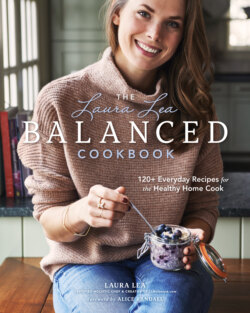Читать книгу The Laura Lea Balanced Cookbook - Laura Lea - Страница 22
На сайте Литреса книга снята с продажи.
ОглавлениеHEALTHY PROTEINS
Proteins are the building blocks of our body,
helping to properly form our skin, nails, hair,
organs . . . you get the picture! Without enough
high-quality protein, our bodies cannot grow
and thrive. Healthy protein options include
the following:
100% grass-fed, pasture-raised beef; pasture-
raised pork; and pasture-raised lamb: “Grass-
fed” refers to the actual diet of a cow, which
should exclusively consist of grasses. Industrial
farms often feed cows grain instead of grass,
which is cheaper and fattens them more quickly.
“Pasture-raised” refers to the environment and
lifestyle of the animals. A pasture-raised cow,
pig, or lamb is raised in a natural environment
conducive to the health of the animal—that is,
how they would ideally live if left to their own
devices. When purchasing beef, look for grass-
fed and pasture-raised. With pork and lamb,
the best you can look for is pasture-raised. If
you want to know what the animals have been
eating, you can contact the company.
Pasture-raised poultry: There are so many
labels out there when it comes to poultry in
general and chicken in particular. Here’s a
basic breakdown: “Free-range” simply means
that the producers must demonstrate that
chickens have outdoor access. However, this
could mean (and often does) one tiny door
leading to the outside in a crowded warehouse
of chickens, so very few ever actually see
the sunlight. “Organic” refers to the type
of feed the animals are given, which can be
completely unnatural, as long as it is certified
organic. It doesn’t speak to the care-taking
practices, so it is our responsibility to inquire.
I personally buy organic rotisserie chickens
from Whole Foods, because they also meet the
5-Step Animal Welfare Rating criteria.
Eggs from pastured-raised poultry: Note,
just because an egg is “local” doesn’t mean
that it comes from pasture-raised chickens.
Again, do some digging on your own to
understand the farm’s practices. Egg yolks
from pasture-raised chickens are one of the
most healthful foods available. They contain a
host of vitamins, including ample vitamin D,
which is difficult to come by in food sources.
They’re full of minerals, such as magnesium,
calcium, and iron, as well as antioxidants
like beta-carotene. Generally, the darker and
more golden/orange an egg yolk is, the more
nutrient-dense it is.
Wild and sustainable shellfish and fish:
Purchasing wild-caught, sustainable seafood
ensures that you are getting the most
nutrient-dense products, and you’re not
contributing to the extinction of any species.
The omega-3 fatty acids found in wild,
sustainable fish and shellfish are incredibly
healing: they can help improve cholesterol
levels, lower inflammation (see Healthy Fats,
page 25, for definition), and boost mood, to name a few benefits. Depending on where you live, it can be easy to source affordable quality seafood. However, that is not the case for me in landlocked Tennessee. As a result, I order my seafood from Vital Choice (vitalchoice.com). It can be expensive, but if you order in bulk and use sparingly, it will last for months in the freezer.
note: If you can find pastured-raised
meat locally, that is the best option, because
you’ll be supporting sustainable practices
in your own area, and the meat should be
incredibly fresh.
